September 7, 2021 - It is just over 8 months since the introduction of the Croatian digital nomad permit. A look at the impact so far.
Eighteen months ago, hardly anyone mentioned Croatia and digital nomads in the same sentence. Today, Croatia is one of the first European countries that comes to mind when talking about digital nomad destinations. The phenomenal free PR generated by the Croatian digital nomad visa story was responsible for much of that. But just over a year since the Croatian government announced its intention to introduce only the second digital nomad visa in Europe after Estonia, how successful has the initiative been, both directly and indirectly, and what are the next steps?
I must confess that a number of things have surprised me about the initiative to introduce a digital nomad visa to Croatia after THAT LinkedIn post by Dutch entrepreneur Jan de Jong, in which he invited Prime Minister Andrej Plenkovic to introduce the visa on May 11, 2020.
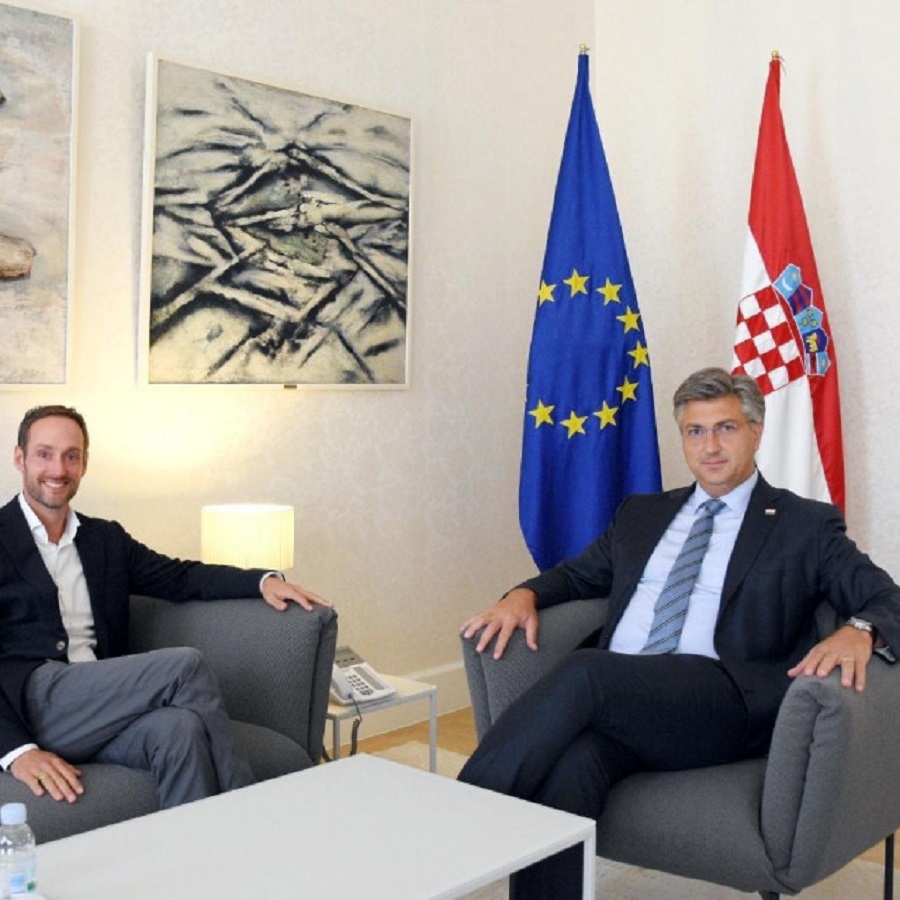
The first surprise was the speed. A meeting was arranged, and then another, and then a few weeks later, a Twitter post from PM Plenkovic with de Jong announcing his intention to introduce the visa as requested. Amendments to the Foreigners Act were introduced the following day in Parliament. No less than 5 ministries were brought together to work on the initiative, the tax code was amended, the Foreigners Act changed, rules for health insurance adjusted, and on January 1, 2021, the new law regulating digital nomads came into force.
The second surprise was the surprise of the first visa recipient, Melissa Paul, an American in Istria who was frantically trying to find a solution to stay in the country after some unusual personal circumstances. Having been advised to try her luck with the new digital nomad visa option (the application only went online on March 1) at her local police station, she was both delighted that this approach worked and then a little taken aback to find out she was officially Croatia's first digital nomad permit (as the 'visa' became) holder in Croatia on January 25. TCN managed to get the first interview with Melissa, but she was soon a global star, giving interviews to the likes of CNN and Euronews.
In my 11 years of writing about Croatian tourism, I can't recall a single story which has generated more positive PR for Croatia, or has had so wide a reach, with the exception of the World Cup.
And that was part of the third - and probably the biggest - surprise: the global media coverage. De Jong - and gorgeous images of Croatia and the Croatian lifestyle - were everywhere. CNN, Washington Post, Lonely Planet, the list went on. It seemed that Croatia was 'in', and the buzz of Croatia as a digital nomad hot spot was taking off. People who had never considered Croatia before were beginning to check it out, and they liked what they saw.
The timing of the visa story also combined with some other factors which made Croatia seem even more welcoming at the height of the pandemic. As the EU shut its doors to travellers from North America and other non-EU/EEA countries, Croatia broke with the bloc and declared Americans welcome last summer. ABC News hopped on a plane to Dubrovnik and did a series of feature stories on magical Dubrovnik, a potential lifestyle capital of Europe, and more gorgeous images were beamed into the homes of 12.5 million Americans on ABC News.
There was also the Schengen factor to consider. Although Croatia is in the EU, it is not yet in the Schengen zone. As such, it makes a convenient exit point for those on a Schengen visa looking for somewhere to spend 90 days before they can reenter the Schengen zone. With all the buzz surrounding Croatia as a cool DN destination, many opted to continue their remote journey here.
It is more than a year since the permit was announced and 8 months sonce it came into effect. So has it been a success so far?
I think that there are a few things to consider when answering that question. These include the actual numbers themselves, the seeds that have been sown, and the overall effect of the PR generated from it all.
The Croatian digital nomad permit is far from perfect, at least in my opinion. I personally think that it is too bureaucratic and that a more streamlined application process would be beneficial and attract more applications. The requirement for a background police check in the home country, while understandable, is a major issue for many wannabe applicants. This is particularly true in the COVID era where there are huge backlogs in some departments for official documents such as this.
The good news is that this is the Croatian Digital Nomad Permit 1.0. Lessons can be learned, changes made, and a smoother process introduced.
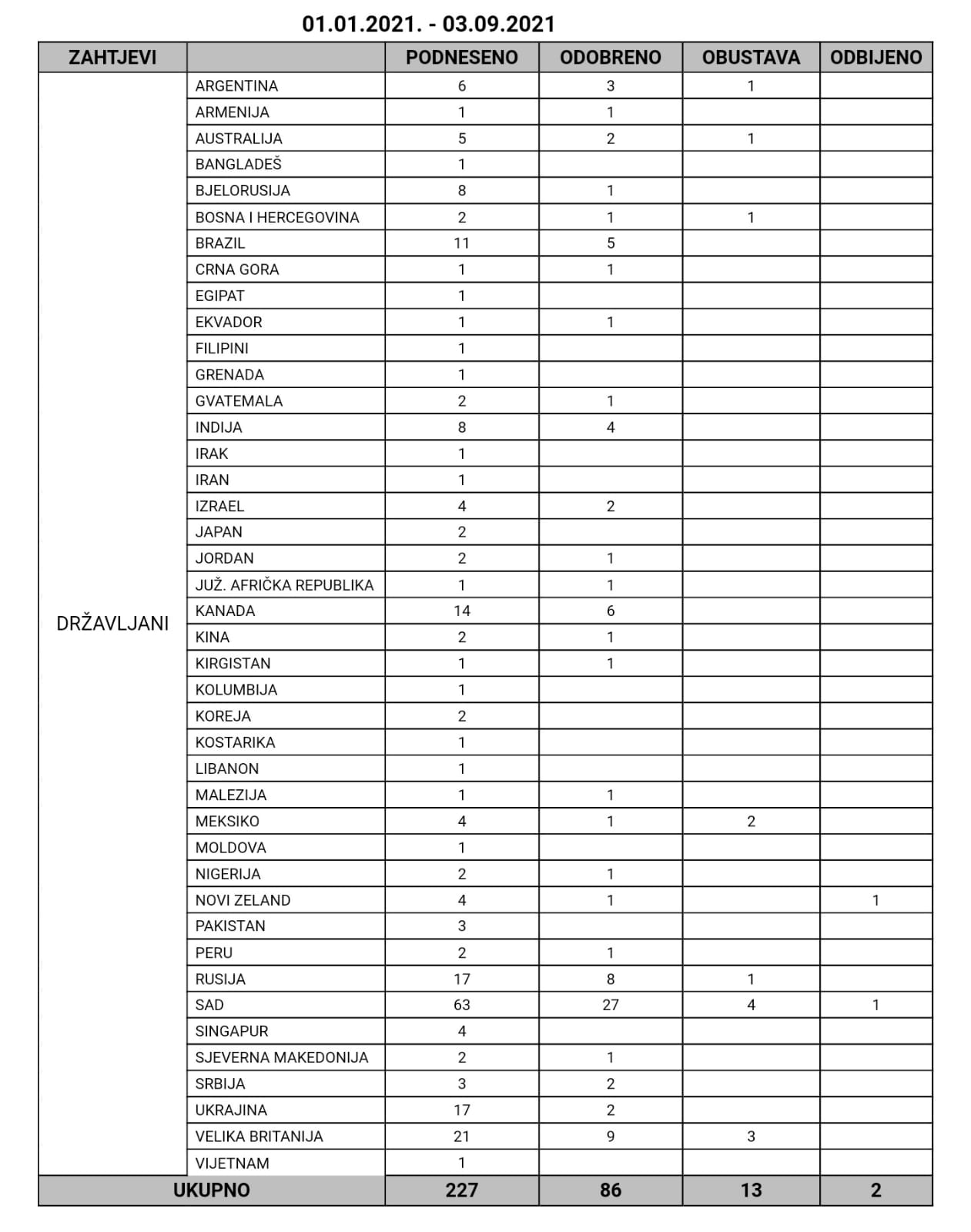
The actual number of applicants has been very disappointing, and I don't think I am alone in thinking that there would be a lot more. As of September 3, just 227 applications, of which 86 have been approved. Approval time is taking about 3-6 weeks on average, with the need to go back and forth for that background check one of the biggest issues.The largest number of applications come from the USA, followed by the UK, Russia, Ukraine and Brazil.
Perhaps the low number of applications is due to the pandemic, the bureaucracy, or simply the fact that digital nomads are nomadic by nature and not all of them want to be in one place for a year. Whatever the reasons, if the permit was being judged on initial results of applications and approvals alone, it would hardly be classed as a roaring success.
And yet...
The Internet was getting busier with more articles about Croatia, more nomads sharing the wonders of Croatia, and more social media groups dedicating themselves to all things digital nomad in Croatia. The largest of these, Digital Nomads Croatia, now has over 6,700 members.
Co-working spaces, once thin on the ground, are opening all over the country. There are at least 17 in Zagreb alone. It certainly feels that there are more foreigners around in Split and Zagreb here for more than just a holiday.
And the data from the article I published this morning, Zagreb, Split Attracting More Digital Nomads than Prague, Krakow, Budapest, would seem to bear that out.
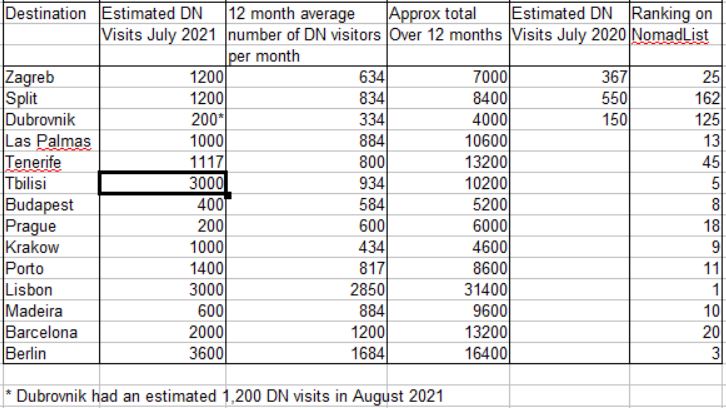
The data (extrapolated from Nomad List) is all explained in the article link above, with an estimated 2,400 nomads in Split and Zagreb in July alone. Numbers that not only compare favourably, but outperform other more established DN destinations in Europe. And with monthly average visitors sharply up on a year ago, a healthy trend for future growth.
And it is not just Nomad List pointing to the popularity of Croatia. A big new survey of digital nomads concludes that "Croatia was rated the top location in the Balkans and Eastern Europe."
Not bad for a small country that was barely mentioned on the digital nomad scene just over a year ago.
As I am learning, the word of mouth effect in the digital nomad community is far more effective than normal. As one nomad put it to me, "we are like herd aninals, create something cool and we will follow."
And Croatia is officially cool. What is nice to see when promoting a destination is for others to come in and do that promotion for you, for free. To global audiences.
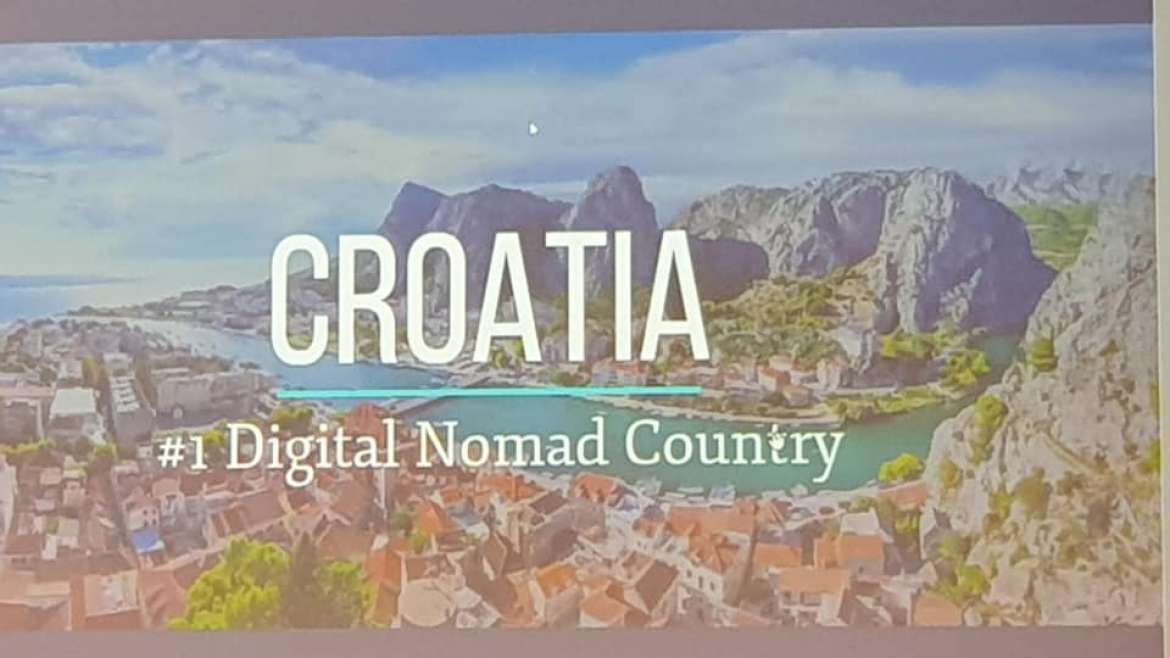
I was a little surprised - and encouraged - to hear Kashlee Kucheran of the influential DN community, Travel Off Path, naming Croatia as her number 1 digital nomad country back in October. Kucheran does an excellent job helping travellers keep up to date with the ever-shifting global travel rules. The Croatian visa caught her attention, and she has been enthusiastically waxing lyrical about Croatia to her global audience ever since.
Official permit holders may be small in number, but some of them are more than making up for the lack of numbers with the noise of their message. Steve Tsentserensky from the USA was the 7th recipient of the permit, and he has had a very active year so far. An in-demand DN conference speaker, Tsentserensky recently published a viral article on CNBC News, with the accompanying video above, which has been watched over 200,000 times already. Simple messages of a high-quality, affordable and relaxed lifestyle, with most of his expenditure going into the local economy. His story has already inspired others to make the move to Croatia.
Another digital nomad whose interest in Croatia was piqued by the visa story was Dean Kuchel, who runs his own digital nomad community numbering 24,000 members. He spontaneously hopped on a plane to Zagreb to present a very entertaining presentation on building community at Zagreb Digital Nomad Week. As you can see from the short video interview above, Dean was very impressed with all things Zagreb, concluding that Zagreb ticks all the digital nomad boxes, and that the only thing Zagreb was missing was more digital nomads.
Indeed, so impressed was he that Dean is currently back in Zagreb for the month of September as the latest Zagreb Digital Nomad Ambassador. For a man who has travelled to over 100 countries in 7 years, tying him down to a 12-month visa will be a challenge, but he will certainly help to spread the message to his niche community and beyond.
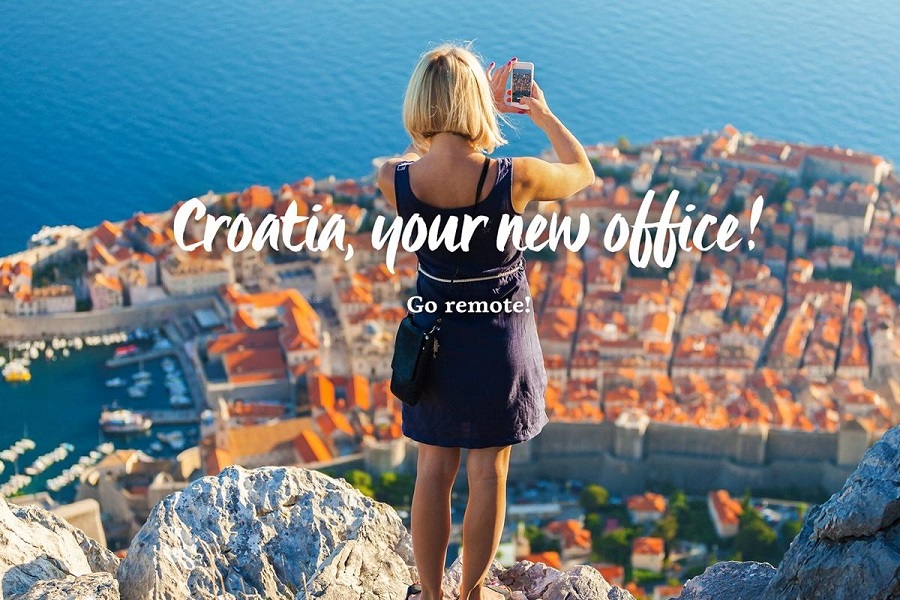
(Photo credit Croatian National Tourist Board)
One area where the visa initiative has played a big role but has not been written about is the success in mobilising official resources and funding. A few weeks before de Jong's LinkedIn post to the Prime Minister, I had a meeting with the national tourist board to pitch some ideas, including promoting Trogir as a digital nomad town. While the idea was well received, I was informed that the national tourist board could not support it due to some tax issue regarding nomads. It was a valid point.
And so the dream of official digital tourism promotion might have ended, but for a private sector initiative which brought together five ministries to thrash out the conditions of the visa. This was followed - almost a year to the day from my meeeting - by a new national tourist board campaign promoting Croatia as a digital nomad destination under the slogan, Croatia, Your New Office.
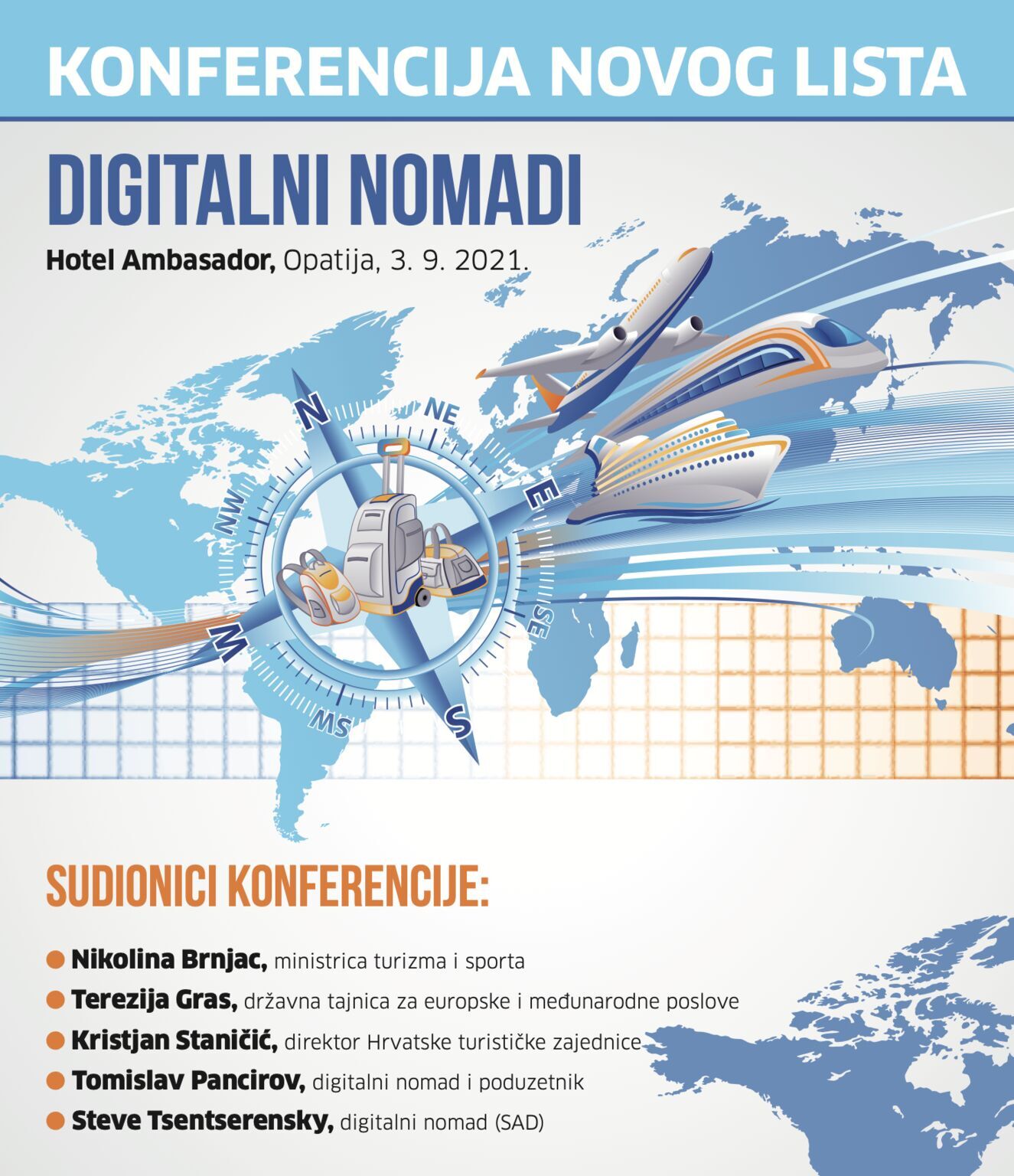
Last week a digital nomad conference in Opatija, featuring Minister of Tourism, Nikolina Brnjac, Director of the Coratian National Tourist Board, Kristjan Stanicic, and State Secretary for the Ministry of the Interior, Terezija Gras, who did perhaps more than any official to make the permit a reality.
And the tourism minister has recognised the promotional value of this new breed of visitor, as TCN reported recently in Digital Nomads Promote Croatian Tourism Best, Says Minister Nikolina Brnjac.
De Jong's inbox has been full since he embarked on this initiative. Global players interested in the remote work possibilities in Croatia. Co-living spaces, digital nomad villages and other ideas which one cannot see the results of right now. But they are coming.
When Croatia announced its digital nomad visa plans last summer, it would have been the fifth country in the world (and the second in Europe after Estonia) to introduce such a visa. Today, just over a year later, there are almost 30 countries offering some version of a permit, a number which will continue to increase.
It may well be that the terms of the permit are improved, and that applications increase considerably once the pandemic subsides. Or not. And if the answer is no, I don't necessarily think that this is a bad thing, for the true value of the Croatian digital nomad visa initiative in (some) hindsight, is the catalyst it provided to move Croatia along in this potentially very lucrative sector. Most things are almost in place, now it takes some good management and clever steering for Croatia to establish itself as a top remote work destination for the next decade based on a simple formula of safety, authentic experiences, and lifestyle.
For more news and features about digital nomads in Croatia, follow the dedicated TCN section.


